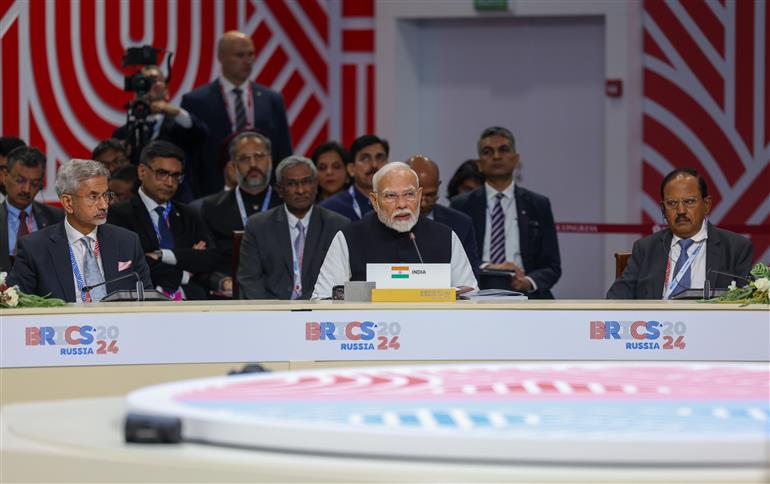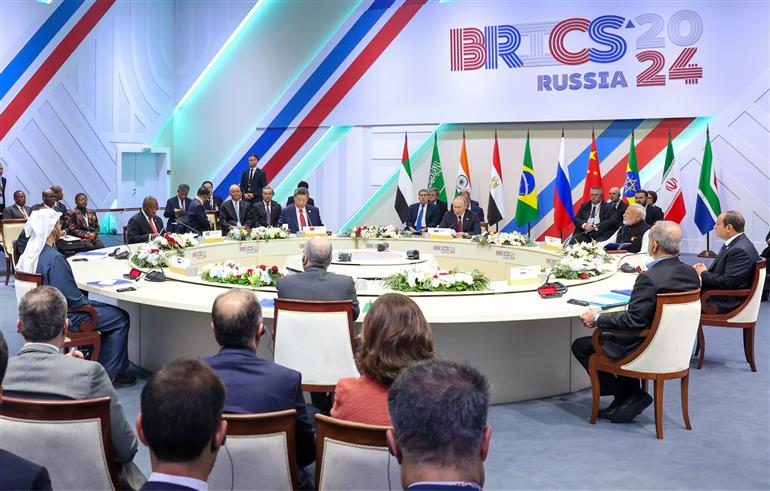The 2024 BRICS summit declares a new path for global peace, trade, and sustainability, making pivotal decisions that will shape global geopolitical and economic landscapes in the years to come. These include a firm commitment to peaceful conflict resolution through diplomacy, the inclusion of new member nations to expand BRICS’ global influence, a shift towards using local currencies in trade, ethical AI development, and stronger climate action efforts. These initiatives aim to foster a more just, balanced, and sustainable world.
The 2024 BRICS summit, held in Kazan, Russia, made pivotal decisions that will shape global geopolitical and economic landscapes in the years to come. The summit emphasized a multipolar world order, aiming to address global challenges collaboratively through peace, diplomacy, economic cooperation, ethical use of technology, and environmental protection. These decisions, reflecting the growing influence of BRICS, could have a transformative impact on international relations, trade, and sustainability.
One of the key highlights of the summit was BRICS’ commitment to the principles of the United Nations Charter, particularly in promoting peaceful resolution of conflicts. As the world faces increasing geopolitical tensions, the BRICS nations – Brazil, Russia, India, China, and South Africa – reinforced the importance of diplomacy over military interventions. This decision underscores BRICS’ stance as a major advocate for a multilateral global order, where no single power dominates. By promoting dialogue and negotiation as the primary tools for resolving conflicts, BRICS seeks to counterbalance the aggressive foreign policies seen in some regions. This approach also benefits smaller nations, ensuring that they have a voice in global governance without being overshadowed by superpowers.
Another major development at the summit was the expansion of BRICS. The inclusion of Egypt, Saudi Arabia, the United Arab Emirates, Iran, and Ethiopia as new members is a significant geopolitical move that broadens the organization’s global reach. This expansion not only strengthens BRICS’ influence but also diversifies the group’s political and economic perspectives. For these new members, joining BRICS means enhanced access to trade, investment, and diplomatic cooperation.
This enlarged coalition represents a combined market with immense resources, offering an alternative to traditional Western-led economic structures. In particular, it challenges the dominance of groups like the G7, giving emerging economies more leverage on the world stage. As BRICS grows, it offers developing nations an opportunity to engage with global markets on their terms, potentially creating a more equitable global economy.
The decision to increase the use of local currencies in trade and investment marks another key outcome of the 2024 BRICS summit. By reducing reliance on the U.S. dollar, BRICS is working toward creating a financial system that is less vulnerable to external shocks and currency fluctuations. This move is particularly significant for countries that have faced sanctions or restrictions from Western financial systems.
Using national currencies in cross-border trade and investment enhances economic sovereignty, making it easier for BRICS members to engage in global trade without depending on the dollar or being subject to its fluctuations. For the world economy, this shift presents an alternative financial ecosystem that could encourage greater resilience and offer developing nations more options in international finance. Additionally, as more countries start adopting this practice, it could lead to a gradual transformation of the global financial order, encouraging diversification and reducing risks of over-dependence on one dominant currency.

Another key decision made by BRICS was the agreement on the responsible and ethical development of artificial intelligence (AI). As AI becomes increasingly integral to economic and social structures, BRICS is taking a leadership role in ensuring its ethical use. The group emphasized transparency, fairness, and the prevention of bias in AI systems. This is especially critical as AI can significantly influence economic growth, employment patterns, and societal well-being. The ethical use of AI ensures that the technology benefits humanity without exacerbating inequalities.
By promoting responsible AI development, BRICS also aims to prevent potential misuse, whether by governments, corporations, or criminal organizations. The summit’s decision reflects an understanding of the transformative power of AI and the importance of regulating its use to protect human rights and global stability. Collaboration on AI research and development within BRICS could also accelerate innovation, helping member countries to compete with other global tech giants. This decision benefits not only BRICS members but also the wider global community, as it sets an example for responsible technological advancement.
The BRICS nations also took significant steps toward climate action and environmental protection during the 2024 summit. Recognizing the critical need to address global warming, BRICS committed to accelerating efforts to combat climate change through renewable energy development and biodiversity conservation. The group’s large share of the world’s population and resources makes its involvement in environmental sustainability crucial. By committing to reduce carbon emissions and promote green energy, BRICS is taking meaningful steps toward mitigating the effects of climate change.
These efforts will not only benefit the environment but also drive economic growth in renewable energy sectors. Additionally, the protection of biodiversity is essential for maintaining ecosystem balance and ensuring long-term environmental health. As climate change increasingly threatens vulnerable regions, the actions of BRICS could serve as a model for other nations to follow. The global fight against climate change requires collective action, and BRICS’ leadership in this area could inspire further international cooperation.
Overall, the key decisions taken at the 2024 BRICS summit represent a bold step toward creating a more just, balanced, and sustainable world. Through its commitment to diplomacy, economic independence, responsible technology, and environmental stewardship, BRICS is positioning itself as a vital force in shaping the future of global governance. The inclusion of new members strengthens its capacity to influence international policies, while the focus on local currencies and ethical AI provides a framework for a more resilient and inclusive global economy. As the world faces numerous challenges, from climate change to geopolitical conflicts, BRICS’ emphasis on multilateralism and cooperation offers a pathway to addressing these issues collectively.
The BRICS nations, with their diverse economic strengths and geopolitical significance, have the potential to lead the way in fostering a more equitable and peaceful global order. By promoting dialogue, supporting technological progress, and addressing environmental challenges, BRICS continues to assert its role as a crucial player on the world stage. The decisions made at the 2024 summit are not just beneficial for member countries but also for the world, as they promote sustainable development, peace, and prosperity for all. As BRICS evolves, its influence on global policies and economic practices will likely continue to grow, offering a counterbalance to existing power structures and creating a more multipolar world.






